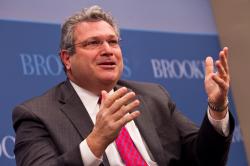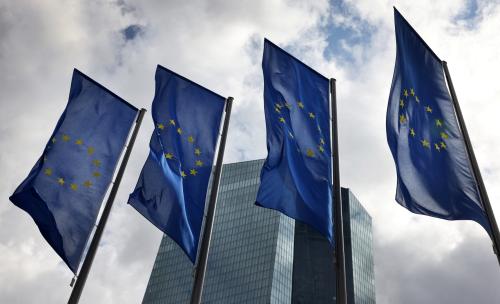

9:00 am EDT - 12:15 pm EDT
Past Event
9:00 am - 12:15 pm EDT
1775 Massachusetts Avenue N.W.
Washington, DC
20036
On September 19, the Brookings Institution’s Strobe Talbott Center for Security, Strategy, and Technology held its first annual Knight Forum on Geopolitics. Named after Trustee Philip H. Knight, the forum brought together the expertise of Brookings scholars from across the Foreign Policy program and beyond to analyze the most significant global issues of the day.
This year’s forum focused on the Russia-Ukraine war, featuring several panels on its far-reaching implications for the region and the world writ large and how it has revealed major geopolitical fault lines in this new era of great power competition.
Viewers can submit questions via e-mail to [email protected] or via Twitter at #KnightForum.
If you are attending in person, Brookings requires all staff and visitors to show proof that they are fully vaccinated against COVID-19 via vaccines approved by the FDA or WHO. After submitting your registration, please proceed to the provided link on the confirmation page to complete the registration process by verifying your vaccination information.
9:00 am
9:00 am - 10:00 am
This panel will focus on the trajectory of the war more than six months since Russia launched its unjustified and barbaric full-scale invasion of Ukraine on February 24 of this year. It will examine the conflict’s evolving battlefield dynamics, the economic and diplomatic elements of the struggle in our globalized world, and how the outcomes we have seen so far have challenged basic assumptions about modern warfare.
Moderator

Panelist


10:00 am - 10:15 am
10:15 am - 11:15 am
This panel will consider the short- and long-term implications for European peace and security, including its effects on tensions between Russia, NATO, and other institutions of European governance, its impact on NATO membership and force posture, and the transatlantic ramifications of the crisis.
Moderator

Panelist

11:15 am - 12:15 pm
This panel will expand the lens of analysis even further, to include Asia, China and Taiwan, South Asia, the Middle East, and the Global South. The human security crisis — including the consequences of the invasion on energy and food security — will also be examined.
Moderator

Panelist



Dina Smeltz, Craig Kafura
December 18, 2025

Douglas A. Rediker, Heidi Crebo-Rediker
December 17, 2025

Christopher B. Johnstone, Adam P. Liff
December 17, 2025